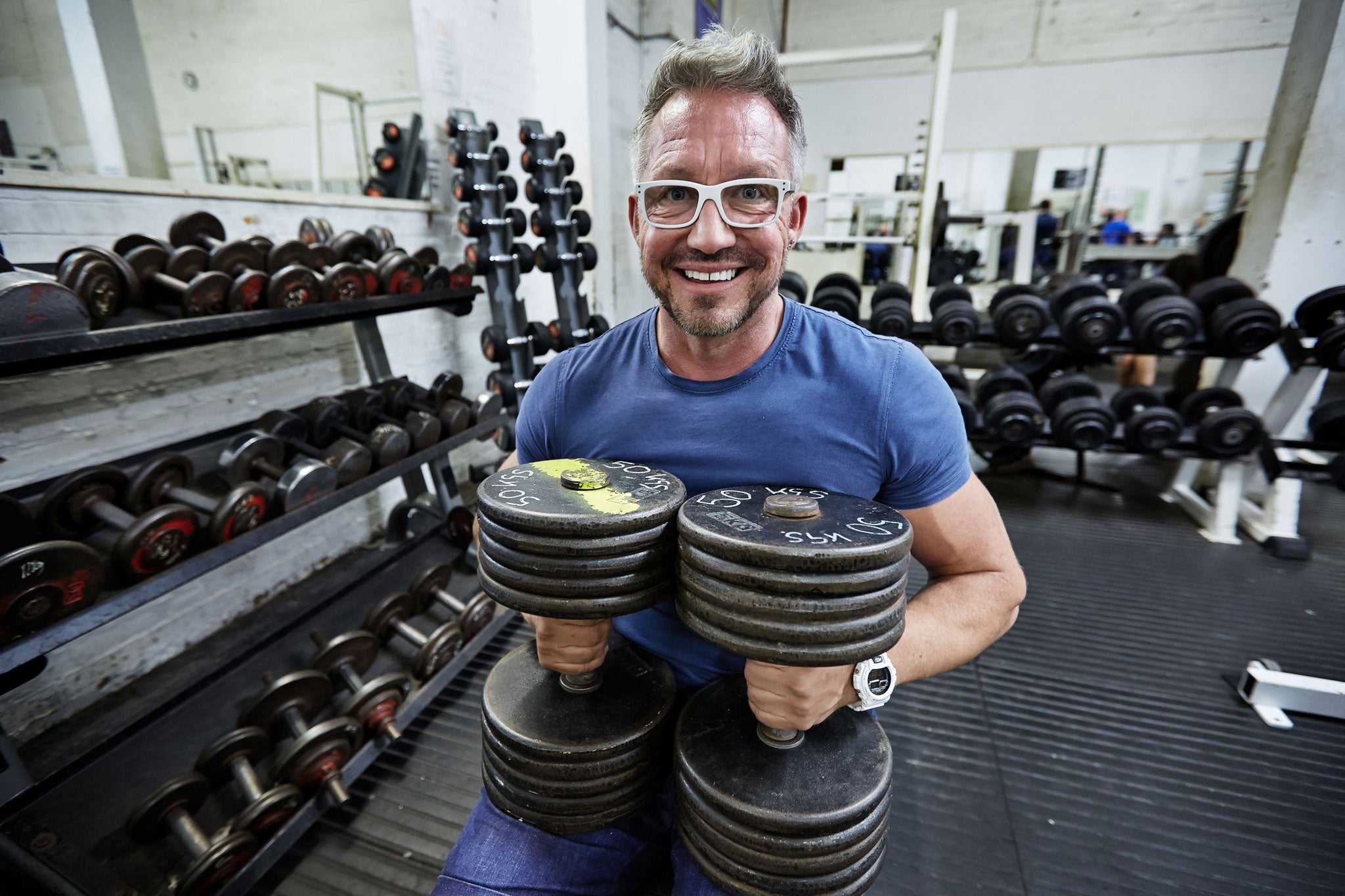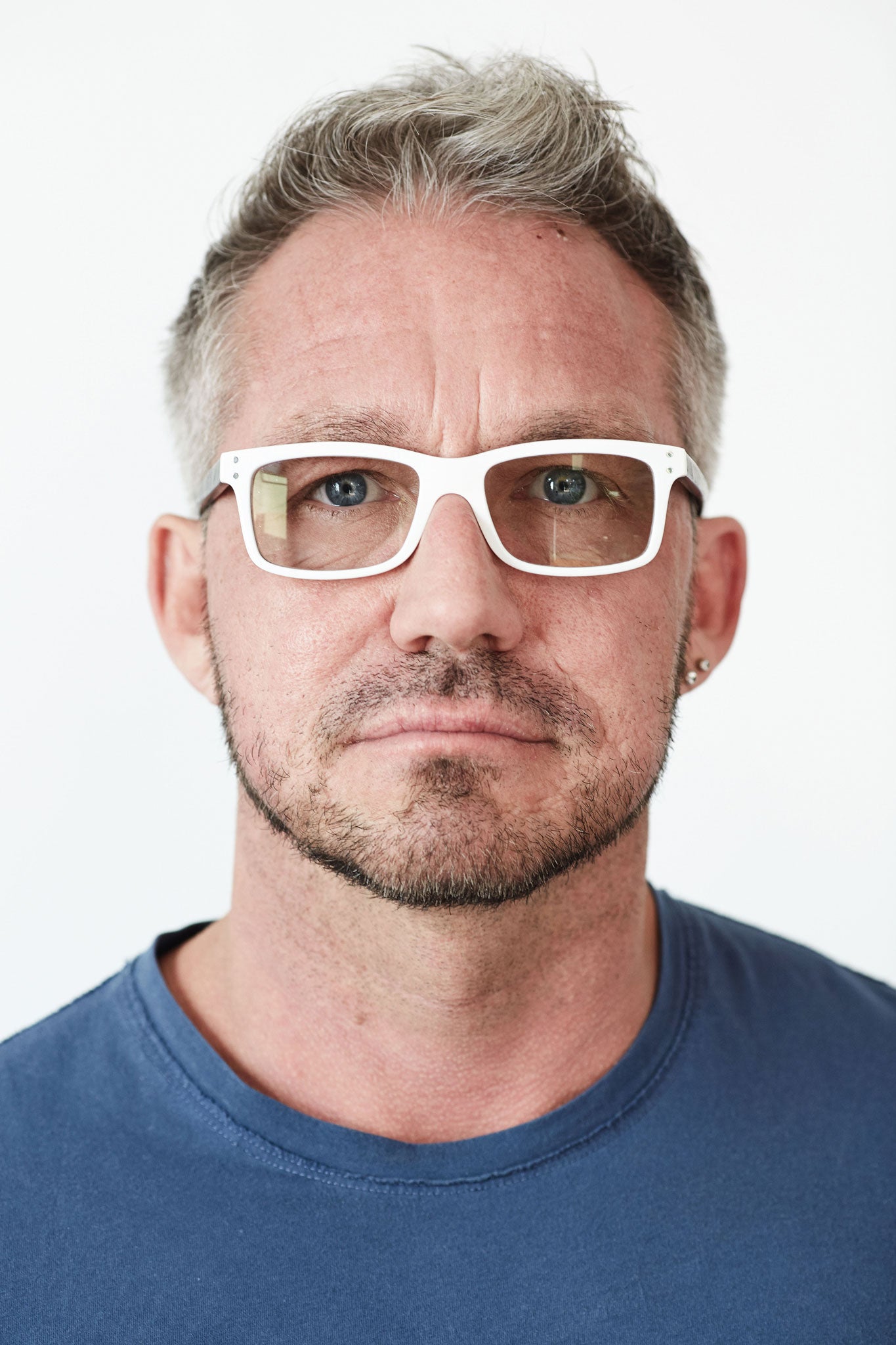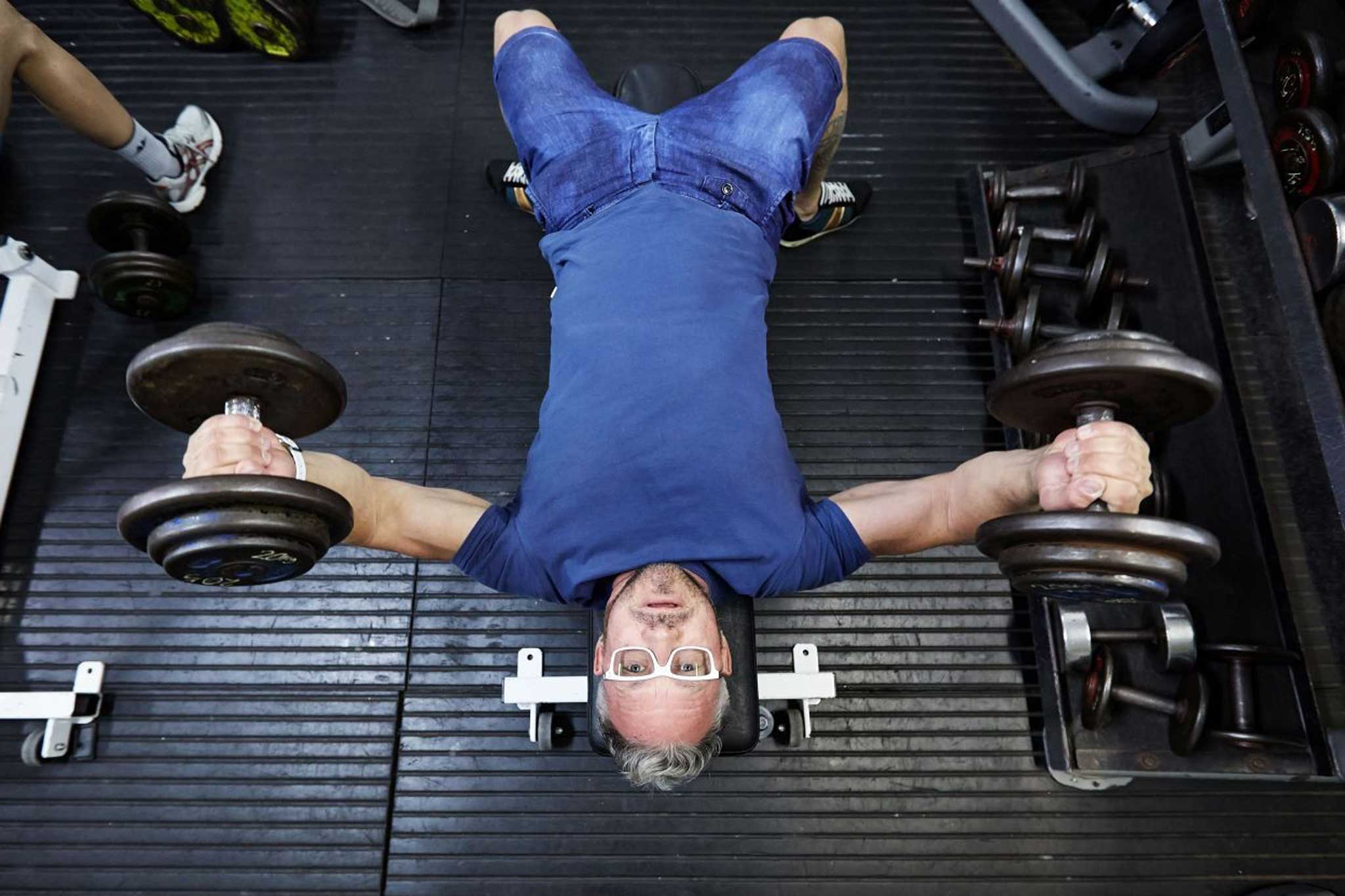A bodybuilding professor's guide to happiness: Meet Paul Dolan, a very scientific self-help guru
Paul Dolan is a world-leading thinker on the science of happiness. And he’s also a bodybuilder. He spends a day teaching Archie Bland how to get happy. (Pumping iron is not compulsory.)

Your support helps us to tell the story
From reproductive rights to climate change to Big Tech, The Independent is on the ground when the story is developing. Whether it's investigating the financials of Elon Musk's pro-Trump PAC or producing our latest documentary, 'The A Word', which shines a light on the American women fighting for reproductive rights, we know how important it is to parse out the facts from the messaging.
At such a critical moment in US history, we need reporters on the ground. Your donation allows us to keep sending journalists to speak to both sides of the story.
The Independent is trusted by Americans across the entire political spectrum. And unlike many other quality news outlets, we choose not to lock Americans out of our reporting and analysis with paywalls. We believe quality journalism should be available to everyone, paid for by those who can afford it.
Your support makes all the difference.In a claustrophobic sweat box of a gym, a 99kg behemoth called Paul stands over me and laughs gently as I struggle to lift an embarrassingly small stack of weights. He is dressed in some fairly skimpy shorts, and a vest that revealed continentally large arms. "Come on, finish the set," he says in his cheerful east London accent, as my own puny bicep archipelagos teeter on the brink of collapse. "Don't wimp out on me now." As I stagger to my feet, he sits in my place and pulls the load down as if it were a stack of cardboard. "Forgot it was on the girls' weight," he says cheerfully. He adjusts it to the highest setting, and gives an almighty heave.
Typical meathead, you might think, and it would have been some consolation to me to be able to think the same. Unfortunately, it's not quite true. His glasses and hair might be excessively funky for a 46-year-old, but in his local gym, Paul is known as 'The Prof'. His full name is Professor Paul Dolan, and he holds a chair in Behavioural Science at the LSE. He's worked with the Office for National Statistics and the government's Behavioural Insights Team – better known as the 'nudge' unit – and he counts Nassim Nicholas Taleb and the Nobel laureate Daniel Kahneman as fans. In other words, this enormous bastard making me feel like a weakling is one of the world's leading researchers into happiness. And he's spending the day trying to show me how to find it.
The pursuit of happiness turns out not to be as much fun as I had anticipated: it was pretty hard, as my biceps wailed at me, to feel especially upbeat. That's why I don't go to the gym as often as I should. That, and the fact that I just haven't got the time. But if you feel the same – if the gym is the opposite of your happy place – you're exactly the kind of person Dolan wants to talk to. He believes that happiness is not the result of what's going on in your brain, but what's going on around you. It's not a question of having time, he argues: it's a question of making it.
In his new book, Happiness By Design: Finding Pleasure and Purpose in Everyday Life, Dolan seeks to upend the usual pattern of self-help manuals. "Your likelihood of buying a self-help book is significantly higher if you've bought a self-help book in the last six months," he says. "You buy one, it tells you to be positive, no shit, I worked that one out. Because the book doesn't help you do it, and you end up even more miserable because you haven't succeed in being positive, so you buy another book that tells you the same thing."
"Nearly all those books are about the conscious mind, about thinking differently," he goes on. "And it's just really hard to change minds. But what you can do more effectively is you can change the environment within which people behave, and that makes their actions different, and that affects how they feel."
Simple. But what does this have to do with the gym? Well, surprising though it may seem, the vast majority of research on happiness sees everything through a hedonic filter: that is, the straightforward question of whether experiences are pleasant or unpleasant. Dolan wants to adjust that, to make us think about life in terms of a balance of pleasure and purpose. Some of us are 'pleasure machines', seeking out short-term gratification without paying close enough attention to our lifelong goals; some of us are 'purpose engines', so determined to get to the destination that we miss the view along the way. Whichever we are, we need to find a bit more of the other. And for an inveterate procrastinator like me, Dolan prescribes the same activity that 13 years ago brought a sense of focus and progress to his life, when he was a scrawny 66kg: regular trips to the gym.
All this, I venture, seems pretty obvious. "It really does make you think you're onto something original and insightful when it seems obvious," Dolan replies, a little defensively. "When people say, 'that sounds obvious', I say brilliant, I'm glad you think so, but in 2,500 years of ethical discourse no-one's actually said it quite like that."

And if the headline is unsurprising, it's in the detail that Dolan's wisdom becomes more apparent. As an economist by training who's moved into happiness research, he's a relatively rare bird: on one hand are the wellbeing experts looking at large sets of data and investigating the impact of factors like unemployment and marriage on people's self-perception, and on the other are the behavioural nudgers, trying to produce different outcomes with the lightest of touches without much regard for happiness as an index of success. "No one's really joined up the lessons of the one with the other," he says. "But you can apply the lessons of behavioural science in a way that's focused on making people happier." >
This contention is backed, throughout the book, with proper evidence. Dolan deploys study after study to make his points. So we learn that having a friend who lives within a mile of you increases the probablility that you feel happy by 25 per cent. Obese people get less pleasure from eating food. Our happiness is not affected by the weather nearly as much as we expect.
So much information might become overwhelming: you might go from not knowing how to be happy to not remembering. And Dolan acknowledges that you can spend too much time asking yourself if you're happy; instead, he says, you should set up your life, and get on with living it. "If you tell people: listen to some music and make yourself happy by doing so, they won't feel happy," Dolan points out. "What we need to do is pay attention to the things that make us happy – not happiness itself." Another striking little study: Dolan asked a group of Chelsea fans how badly their state of mind would be affected by losing the 2008 Champions League final, and then followed up afterwards. He found that those fans were much more affected by the defeat than another group of fans who he only surveyed after the fact – and who weren't primed to think about the hurt in advance.
He's an unusual man, Professor Dolan: like a successful athlete, he carries that matter-of-fact self-confidence that can seem to shade into arrogance. Sometimes there's a dash of the Partridge-esque. "People ask me how I've done it," he says. "Well, I've been largely lucky, but I'm also clever. I don't feel like that's arrogant or anything, but I really hate false modesty. A lot of people said you can't write a book for everybody, it's impossible – well, to me that was a challenge. And I think serious academics and people who want a self-help book can all buy that and get something from it."
On the page, this is pretty annoying; not for nothing was his wife charged with taking a red pencil to anything in the book that failed the 'dickhead test'. In person, though, it's bafflingly likeable, and disarmingly direct. For example, he made that observation about the difficulty of instructing yourself to be happy while standing opposite me almost naked. We were changing out of our gym kit in his office; while this situation left me feeling more than a little awkward, nothing will stop Dolan talking about happiness.
So. We turn back to mine. The idea is to head to my flat and give Dolan a small tour of my life, so that he might offer a prescription. My problem, I say before we set off, is that I'm hopelessly inefficient. I'd like to write a book, for example, like your usual clichéd journalist, but I just don't seem to be capable of committing to it.
"Well," he asks, "how much do you really want to do it? Because you would have fucking done it by now if you really wanted to. Give up this ideal self you have, this story you tell yourself, about the kind of person you are, and live with the fact that you're a lazy bastard who doesn't want to do very much." I feel like I've been slapped in the face with a wet fish – by an enormous bloke with tattoos who's still only wearing his pants. It's bracing, and probably fair enough. And it has the potential to be extremely liberating.
Shaken by these truthbombs, I hail us a cab back to my flat, a task rendered significantly harder by the fact that those weights have made it almost impossible to lift my arm above perpendicular. On the way we stop at the supermarket at Dolan's request to pick up a bit of lunch – he's always urgently interested in a healthy feed after a trip to the gym. This provides another example of his economist's contention that attention is a limited resource, and so our decisions about how to deploy it have a significant effect on our state of mind. "I can't be bothered choosing," he says. "I always get other people to order my dinner for me. You can agonise over these decisions and it ruins the meal."

This observation is uncannily relevant to my own tendency to feel deep regret as I toy with my chicken and stare wistfully at my companion's steak. Childishly, I pick up the least wholesome thing in my eyeline. "Pork pies," he says doubtfully. "Yeah… it's not quite healthy, is it. Yeah."
We head back to my flat, where I often work, and Dolan makes some striking observations. I'm better off working in my kitchen than the spare bedroom, since it's lighter, and the higher ceiling will be more conducive to creative thought. (There's been a study.) He advises me to tidy up. Then there's what I consider my extreme procrastination, manifested when we open my laptop in the 15 tabs visible in the internet browser. He has a double remedy: stop myself doing it by going out of wireless range, yes, but also just accept it, because it's probably not as big a deal as I tell myself.
"People are always saying they're extreme cases of things," he replies. "The number of people I've heard saying what you just said, I'm an extreme procrastinator – oh my god. 'Addictive personality' is the other one. 'I've got an addictive personality so I don't do drugs.' Well, you probably haven't got an addictive personality, then, have you. You just like the idea of it."
This distinction is at the heart of Dolan's argument: between the experiencing self, the version that feels things directly, and the story-telling self, who is more interested in constructing a version of their life that feels right. Maybe I don't want to write a novel at all, in other words. Maybe I just want to hold a novel with my name on it.
All this applies as much to one's personal life as one's work, of course. As it happens, my girlfriend and I have been going through a pretty tough time, partly to do with a problem that I suspect a lot of people have: how do you know if you're right for each other? To us, this is a complex question about the future, compatibility, the pleasing self-perception as a person who is in love. To Dolan, it's far simpler. "This thing of evaluation versus experience, it's critical in relationships," he says. "People come up with bollocks about who's their type, they have these ideas about the kind of person they should be with based upon a set of characteristics that are really just the stories they're telling themselves."
"Actually, the simple question is: am I enjoying being with this person? Not am I happy, but how did I feel yesterday, and the day before, and the day before? And if you're always feeling pissed off, something's up. If you enjoy her company, she's right for you! If you're not, find someone else!" He doesn't mention 'love' once.
This is so simple as to seem simplistic. But actually, I don't think it is. As Dolan finishes his pork pie and bids me farewell, I reflect on all his advice. Straightforward though it is, it's also incredibly hard to follow: the trouble is, the stories we tell ourselves are often bound up so tightly in our experiences that it's hard to tell the two apart. There may be real satisfaction to be gained from making the story of yourself come true. But I can't deny he might have a point about the novel.
And if I'm not quite ready to give it up yet, I see the value of his primary point: if you think you know what will make you happy, don't just think about it – create the world in which it's possible, and then see what happens. And so, the day after I meet Professor Dolan, I sign up for a creative writing course. Happiness is so much easier to achieve with a deadline.
'Happiness By Design: Finding Pleasure and Purpose in Everyday Life' by Paul Dolan is out now, Penguin, £20
Join our commenting forum
Join thought-provoking conversations, follow other Independent readers and see their replies
Comments